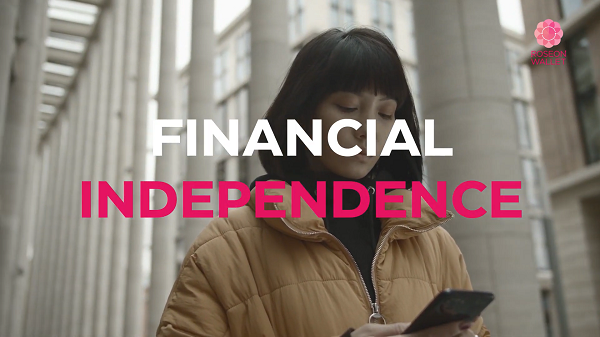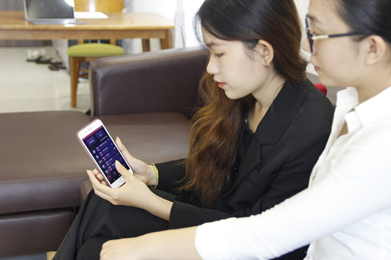
A History of Financial Exclusion
When traveling in Southeast Asian countries, you will definitely experience a culinary culture full of local identity and style. Take a moment to look around you though, and you’ll notice that nearly 70% of such street vendors are women. A small discovery, but also a reason to reflect on the difficult lives of many Southeast Asian women.
In Southeast Asia, a woman has to face many prejudices and constraints since birth. Common examples are: “Women do not need to learn much”, “Marriage must depend on your husband”, “You must give birth to a son to continue the family line”, “you must stay at home and do housework”, and so on. Thousands of years of tradition and toxic gender power dynamics push women into the role of producing children, serving their husband, and menial household tasks. Many people choose to accept this as an unfortunate but unavoidable truth.

One consequence of this gender inequality is that women aren’t trusted to handle financial matters. In many families, the woman is only given monthly living expenses to take care of the family — they don’t ever posess or control any money beyond that themeselves. Less resources are allocated to their education, so they only have access to jobs paying minimal salaries for hard, unskilled labor. In South Asia, 1 out of 3 women will be in this unskilled labor market, many without the protection provided by a formal work contract.

The lack of focus on women’s education excludes them from the benefits of new technologies. The situation where older women are struggling with or need to ask for instructions to be able to use smartphones, install Facebook apps, Youtube, and so on — it’s practically a stereotype. If you look at the gender ratio in university Science, Technology, Engineering and Maths (STEM) classes, it’s pretty easy to see that women barely benefit at all from the development of new technologies. This is significantly worsened by the fact that access to finance (and investment) requires more access to technology now.
Currently, blockchain technology has been becoming popular in Southeast Asian countries. People are gradually becoming familiar with the tools to use it: smart contracts, digital money, and e-wallets. However, using these still requires a high degree of technical sophistication. We have to honestly ask ourselves whether women are being afforded access to these tools — are we truly creating a fair and decentralized economy? Or are we inadvertently perpetuating systemic inequalities that have existed for ten thousand years?
Hard-Won Progress
I believe that no matter how repressed, women still carry within themselves the strength to rise up like an oncoming storm. Amid the numerous disadvantages, many women have overcome incredible odds to find their own freedom — especially financial freedom.
Times are changing, and the roles of men and women are changing. If in the past, they were bound, restricted in family life, role and position at work, now they can more freely speak their voice, and hold positions of influence in society. Women hold 28% of global management positions, and 22% of government cabinet ministers. This shows both that the system is still unfair, but also that it is capable of change — perhaps tomorrow, we can make it a little more fair than today. More and more women desire a healthy social life, good jobs, and travel… through their own labor and the consequent financial freedom it offers.
“When I have the opportunity to work in a company in Blockchain technology, especially when introduced to Roseon Wallet, my life is like opening a new page. I was able to take care of myself and contribute a part to my family’s finances. Above all, I have gained certain confidence for myself ”. Those are the words of a young female student whom we had the opportunity to interview.

More and more women desire careers — not only as an alternative to family life, but also as a supplement or even a prerequisite to one. They hope to gain economic autonomy by their own merit, not through marriage (an unreliable way to achieve that anyway). Financial independence is a safe backbone that their mothers never had, and gives them the power to make better choices. That is why they intentionally create a career first — so that marriage can be a choice, not a requirement.
In an interview with Phuong Lyn, she said: “In the past, my life was only going to work, going home, and after that I had children so I only took care of my children. I don’t even think of my wallet. After being introduced to Roseon Wallet by a friend, I carefully researched it. Up to now, Roseon Wallet has helped me manage my finances ”.
Women today have bigger roles to play. If they were only housewives yesterday, today they are women with independent careers. They have many opportunities to grow, they can break old stereotypes and live the way they want. Participate in all activities as equals, equipped with the necessary knowledge to lead an independent life. If they decide to commit to marriage and/or a family, it will be in the confidence that it is their own decision.
Technology and Financial Inclusion
Knowledge helps us become more confident and proactive by exploring competencies by itself. However, in practice we need to apply technology to use that knowledge to better our lives.
In everyday life, technology exists in all areas. In work management, we have office applications that help distribute and connect information and data. In home care, we have home status apps, menu recommendations and recipes online, etc. In sports, you can connect to your favourite team using just your phone. Entertainment is endless: games, collectibles, virtual reality, etc.
What about technology in finance? Perhaps we are familiar with the spending management apps, and Internet banking apps of traditional banks. However, with digital assets and blockchain, it’s possible to have wallets independent of any bank that hold digital money too. They also let you grow your assets within the application! Roseon Wallet, for example, is focused on letting you hold all your digital assets in one place — and giving you access to tools to grow your assets using decentralized finance (DeFi). Their mission is to bring the benefits of cryptocurrencies, DeFi and Blockchain to people around the world in the safest and easiest way.

New technologies are always being developed to serve human needs in new and different ways. Blockchain and digital currency wallets like Roseon are no exception — but we need to make sure that every new technology ends up in the hands of the people that need it.
Source: unwomen.org, un.org
First published on Roseon Finance’s Medium and cross-published on SCN with permission.


